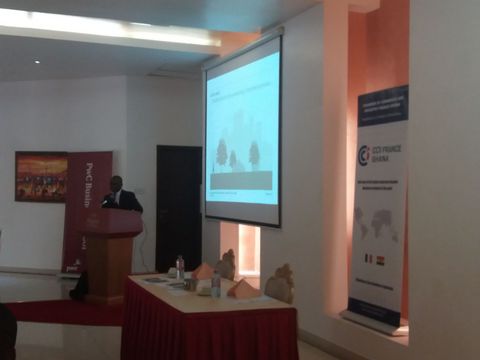The Chamber
CCIFG organised a Business Breakfast on the Tax System in Ghana

The Chamber of Commerce and Industry France Ghana (CCIFG) held a Business Breakfast with PricewaterhouseCoopers (PwC) on the Ghanaian Tax System, to clarify misgivings, and understand the key changes that occurred since January 2016, as well as the implications that may have emerged. The Business Breakfast, held on 23rd February at the Best Western Premier Hotel, gathered business executives from different industries in the country, comprising both CCIFG members and non-members.
The well-attended event offered participants an opportunity to get the much needed insight on some of the tax implications on the key stakeholders of companies; in particular, shareholders, employees, suppliers and customers. Mistakes often made by businesses which ultimately increase their costs and/or negatively impact their reputation were highlighted. The event also discussed some of the potential implications of reductions, increases and removal of some existing taxes in line with the current Government’s 2016 manifesto.

The main-speaker from PwC, Mr Abeku Gyan-Quansah, shared good news available to the business community. This included the reduction of the general branch profit tax rate from 10% to 8% and the carry forward of tax losses available to all industries. He cautioned business executives to take note of the expanded definition of Value Added Taxes on entertainment expenses, income tax impact on concessionary loans given to employees and the reduction of time period for making income tax refund applications from six years to three years. He mentioned that although it would be beneficial for entities to be financed by debt, due care should be given to the new thin capitalisation rules and the special treatment for the deductibility of financial cost. He highlighted some increasing areas of tax disputes such as transfer pricing and recommended companies dealing with related parties to have contemporaneous transfer pricing documentation to defend their intercompany pricing arrangements. He also mentioned an area that is often overlooked which has to do with changes required by accounting systems and procurement procedures to align with changes in tax laws, for example, to ensure that businesses should avoid dealing with suppliers that do not have Taxpayer Identification Number (TIN).
Reviewing some assertions of the new Government, Mr. Gyan-Quansah highlighted that the Government may be looking to reduce certain taxes and eliminate others. To match this potential revenue loss, the Government is likely to broaden the tax base and focus more on tax compliance. This will mean the Ghana Revenue Authority is likely to focus on the enforcement of tax laws. The penalty regime in Ghana as a result of the introduction of the Revenue Administration Act is more punitive and incorrect returns may potentially lead to penalties of up to 100% of the tax shortfall. Hence, PwC recommended to our C-suites to ensure compliance with tax laws including filing requirements (e.g., filing of annual corporate income tax, transfer pricing and annual employers’ deduction returns on time).

The event ended on a positive note, with a Question & Answer session which gave participants, the opportunity to raise issues and concerns that were adequately addressed by PwC.
To ensure members receive the most benefits, CCIFG continues to organize business networking events as well as give constant business support, making it one of the largest and most dynamic business networks in the world. The Business Breakfast organised on the Tax System in Ghana, goes beyond forming part of CCIFG’s effort to provide this business support to members, but is also a significant contribution to the global rising of activities of the France in Ghana network as the diplomatic relations between the two countries mark its 60 years’ anniversary alongside the 60th independence of the Republic of Ghana.



